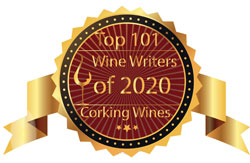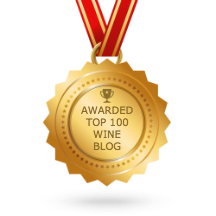For my final wine review of the year, red wine review is a delicious, organic blend of Cabernet Sauvignon and Merlot from South Africa that arrived at the LCBO in the LCBO VINTAGES New Release Collection.
It is produced by Cape Pastoral, a wine brand based in the Western Cape wine region of South Africa that is focused on crafting organic wines with minimal intervention.
The Western Cape is known for not only its rural beauty, including fauna and flora, but also its grape growers and winemakers, who are well-grounded as the primary preservers of the region's grape-growing soil. Cape Pastoral wines are the result of a harmonious relationship between the Western Cape's grape-growing soil, weather elements, and the natural response of the winemakers to transform the grapes into tasteful wines.
This ethos is reflected on the label of each Cape Pastoral wine. This wine has flowing shades of orange which represent the sun and its role as core source of earth’s energy, while the spots refer to the dispersal of seeds that happens naturally without human interference. The bee is an important pollinator of crops which are facing the threat of deforestation. Together, these visual elements tie into the pastoral style of creative works that idealize rural life and landscapes, while also alluding to the harmony that can exist when humans take a hands-off approach to nature.
Although I was not able to get the exact composition at the time of this post, this red wine is composed of Cabernet Sauvignon and Merlot. The grapes were grown and certified organically. After harvesting the grapes, they arrived at the cellar and were meticulously sorted by a sorting machine to ensure only the finest grapes were vinified. It was fermented using natural yeasts, and spent a considerable amount of time on its lees to create a creamy, textured mouthfeel. It also spent some time in oak to add spice characters and soften the tannins.
The growing season for the 2023 vintage in South Africa's winelands was generally dry and warm, with budbreak occurring slightly earlier than average. Conditions were optimal in spring and early summer, with abundant rains early in the season, just before veraison, which aided fruit quality. A cool and wet summer prolonged ripening, while unseasonal rains that arrived in March prolonged the harvest into April for many. This meant that picking decisions and careful vinification was required for late-ripening varieties such as Cabernet Sauvignon. From a vintage that was cool and long with reduced yields, let's see how this 2023 Cabernet Sauvignon and Merlot from South Africa is tasting tonight...
Enclosed by screw cap, this organic blend of Cabernet Sauvignon and Merlot has a lifted, medium+ to medium-high intensity nose of dark fruit and cedary oak spice aromas layered over currant, cassis, earth, and black plum, with hints of chocolate. The dry, medium-full bodied palate has pleasant dark berry, currant, cassis, and oak spice flavours joined by green herbs, savoury earth, and cocoa notes. Clean and well-made with crisp acidity, while the refined and textured tannins are gently grippy. Crisp and juicy with savoury earth, oak spice, and mocha chocolate notes on the lengthy finish. Pleasantly surprised and a recommended buy. Score: 88+ pts
There is only one other wine by Cape Pastoral and it can be ordered through their Agent - KOLONAKI Group of Companies.
It is produced by Cape Pastoral, a wine brand based in the Western Cape wine region of South Africa that is focused on crafting organic wines with minimal intervention.
The Western Cape is known for not only its rural beauty, including fauna and flora, but also its grape growers and winemakers, who are well-grounded as the primary preservers of the region's grape-growing soil. Cape Pastoral wines are the result of a harmonious relationship between the Western Cape's grape-growing soil, weather elements, and the natural response of the winemakers to transform the grapes into tasteful wines.
This ethos is reflected on the label of each Cape Pastoral wine. This wine has flowing shades of orange which represent the sun and its role as core source of earth’s energy, while the spots refer to the dispersal of seeds that happens naturally without human interference. The bee is an important pollinator of crops which are facing the threat of deforestation. Together, these visual elements tie into the pastoral style of creative works that idealize rural life and landscapes, while also alluding to the harmony that can exist when humans take a hands-off approach to nature.
Although I was not able to get the exact composition at the time of this post, this red wine is composed of Cabernet Sauvignon and Merlot. The grapes were grown and certified organically. After harvesting the grapes, they arrived at the cellar and were meticulously sorted by a sorting machine to ensure only the finest grapes were vinified. It was fermented using natural yeasts, and spent a considerable amount of time on its lees to create a creamy, textured mouthfeel. It also spent some time in oak to add spice characters and soften the tannins.
The growing season for the 2023 vintage in South Africa's winelands was generally dry and warm, with budbreak occurring slightly earlier than average. Conditions were optimal in spring and early summer, with abundant rains early in the season, just before veraison, which aided fruit quality. A cool and wet summer prolonged ripening, while unseasonal rains that arrived in March prolonged the harvest into April for many. This meant that picking decisions and careful vinification was required for late-ripening varieties such as Cabernet Sauvignon. From a vintage that was cool and long with reduced yields, let's see how this 2023 Cabernet Sauvignon and Merlot from South Africa is tasting tonight...
Tasting Note:
CAPE PASTORAL ORGANIC CABERNET SAUVIGNON / MERLOT 2023 - WO Western Cape, South Africa (#36978) (XD) - $13.95Enclosed by screw cap, this organic blend of Cabernet Sauvignon and Merlot has a lifted, medium+ to medium-high intensity nose of dark fruit and cedary oak spice aromas layered over currant, cassis, earth, and black plum, with hints of chocolate. The dry, medium-full bodied palate has pleasant dark berry, currant, cassis, and oak spice flavours joined by green herbs, savoury earth, and cocoa notes. Clean and well-made with crisp acidity, while the refined and textured tannins are gently grippy. Crisp and juicy with savoury earth, oak spice, and mocha chocolate notes on the lengthy finish. Pleasantly surprised and a recommended buy. Score: 88+ pts
There is only one other wine by Cape Pastoral and it can be ordered through their Agent - KOLONAKI Group of Companies.

































































